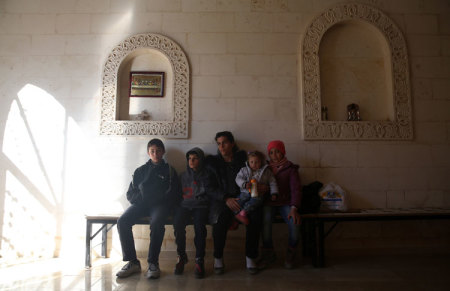State Dept.: Syrian Christian Persecution Part of 'Largest Displacement of Religious Communities in Recent Memory'

Persecution of Christians in Syria is part of the worst displacement of religious communities in recent history, according to a recently released report from the U.S. State Department.
Released Monday by the Bureau of Democracy, Human Rights, and Labor, the International Religious Freedom Report for 2013 stated that last year "the world witnessed the largest displacement of religious communities in recent memory."
"In almost every corner of the globe, millions of Christians, Muslims, Hindus, and others representing a range of faiths were forced from their homes on account of their religious beliefs," read the report.
"Communities are disappearing from their traditional and historic homes and dispersing across the geographic map. In conflict zones, in particular, this mass displacement has become a pernicious norm."
The State Department specifically cited Syria as an example of the trend, noting the large number of Christian refugees due to their ongoing civil war.
"In Syria, as in much of the Middle East, the Christian presence is becoming a shadow of its former self. After three years of civil war, hundreds of thousands fled the country desperate to escape the ongoing violence perpetrated by the government and extremist groups alike," continued the report.
"In the city of Homs the number of Christians dwindled to as few as 1,000 from approximately 160,000 prior to the conflict."
In 2011, after years of dictatorial rule under President Bashar al-Assad, Syria experienced major political upheavals as part of the regional "Arab Spring" movement.
As the year progressed, opposition that Assad had attempted to violently suppress became increasingly organized and struck back at the government.
The ensuing civil war has been a conflict rife with atrocities and large numbers of civilians being killed or driven from the nation.
Three years since the conflict began, the violence has not let up. According to the Associated Press, over the past two weeks approximately 2,000 Syrians have died.
"More than 2,000 Syrians — almost half of them pro-government forces — have been killed in just over two weeks of fighting in Syria, marking one of the worst death tolls in the country's three-year civil war, opposition activists said Monday," reported the AP.
"The reports reflect a recent surge in deadly attacks by the al-Qaida-breakaway Islamic State group targeting President Bashar Assad's forces, signaling shifting priorities as Sunni militants seek to consolidate their hold on territory and resources in northern Syria."
The State Department's report highlighted numerous examples of religious intolerance abroad during 2013, including anti-Muslim violence in Burma, the church bombing in Peshawar, Pakistan, and discriminatory policies in nations like Saudi Arabia and Iran.
The report also noted examples of interfaith cooperation in the face of religious extremism and sectarian violence.
"Following the deadly Peshawar church bombing in Pakistan, resilient Muslim community members formed human chains around churches during services in a show of solidarity and to stand up against senseless violence," noted the report.
"In Egypt, Muslim men stood in front of a Catholic church to protect the congregation from attacks. And after an increase of mosque attacks in the United Kingdom, a local orthodox Jewish neighborhood watch team began assisting Muslim leaders to ensure safe access to mosques and alert them to possible attacks."






















